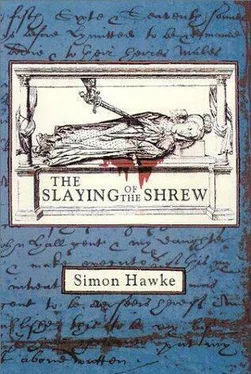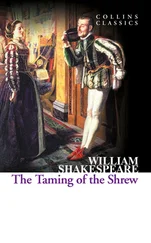Simon Hawke - The Slaying Of The Shrew
Здесь есть возможность читать онлайн «Simon Hawke - The Slaying Of The Shrew» весь текст электронной книги совершенно бесплатно (целиком полную версию без сокращений). В некоторых случаях можно слушать аудио, скачать через торрент в формате fb2 и присутствует краткое содержание. Жанр: Исторический детектив, на английском языке. Описание произведения, (предисловие) а так же отзывы посетителей доступны на портале библиотеки ЛибКат.
- Название:The Slaying Of The Shrew
- Автор:
- Жанр:
- Год:неизвестен
- ISBN:нет данных
- Рейтинг книги:5 / 5. Голосов: 1
-
Избранное:Добавить в избранное
- Отзывы:
-
Ваша оценка:
- 100
- 1
- 2
- 3
- 4
- 5
The Slaying Of The Shrew: краткое содержание, описание и аннотация
Предлагаем к чтению аннотацию, описание, краткое содержание или предисловие (зависит от того, что написал сам автор книги «The Slaying Of The Shrew»). Если вы не нашли необходимую информацию о книге — напишите в комментариях, мы постараемся отыскать её.
The Slaying Of The Shrew — читать онлайн бесплатно полную книгу (весь текст) целиком
Ниже представлен текст книги, разбитый по страницам. Система сохранения места последней прочитанной страницы, позволяет с удобством читать онлайн бесплатно книгу «The Slaying Of The Shrew», без необходимости каждый раз заново искать на чём Вы остановились. Поставьте закладку, и сможете в любой момент перейти на страницу, на которой закончили чтение.
Интервал:
Закладка:
“Stage fright,” Dick Burbage called it. “ ‘Tis a thing to which most players fall victim at one time or another. To some, it means merely an unsettled stomach and a slight trembling of the hands or knees, a sort of giddy, momentary weakness overcome the moment they step out onto the stage and plunge into the role. For others, it is a nearly unbearable, oppressive pressure in the chest, the heart beating like a wild thing trying to claw its way free of the flesh, violent shaking and cold sweats, a paralyzing fear that becomes completely all consuming. And yet, for all that, it often goes away once they step out onto the stage and become caught up in the play. Most players get over it in time. Still, with a few… it never truly goes away.”
“What do such people do?” Smythe asked him.
“Well, if they wish to remain actors, then they must act as if it does not bother them,” Burbage had replied.
“And if they cannot?”
Burbage shrugged. “Then it must inevitably become evident to them that they might well become good ostlers, or perhaps masons, or smiths or carpenters or coopers, or else merchants, ironmongers, jewelers, butchers, saddle-makers, rivermen or scribes, but sadly, they never can be players. Lack of talent may be compensated for to some degree with industry and diligence, but nothing in the world may compensate for lack of courage. Mind you now, having courage does not mean having a lack of fear. It means having the ability to persevere in spite of it. The principle is the same, you see, whether one stands upon the stage or upon the field of battle. The soldier who faces enemy troops and quails before them is, in some respects, no different from the player who faces an audience and is struck with fear. The singular difference between them is that in the soldier’s case, the fear might well cost him his life. And thus far, Tuck, I have never heard of an audience so hostile that they have actually killed a player. Still, there is always a first time, I suppose…”
“Look, Tuck,” Shakespeare said, interrupting his thoughts, “I have written enough for one night. I need a respite. Let us go downstairs and have some ale. You need to stop this lying about and moping. Most of the others will be down there still, discussing their preparations for the journey. At least, the ones who have not yet drunk themselves insensible. You need to get your mind on other things. There will be other girls in other towns, doubtless a few pretty enough to make you forget all about Elizabeth Darcie. And they will doubtless be much more accessible.”
“Perhaps, but they shall not be Elizabeth,” Smythe said. “ ‘Twould never be the same.”
“Blow out the candles, then,” Shakespeare replied, wryly. “All cats are gray in the dark, my friend. Come on, let us go and have ourselves a drink or two or three.”
They made their way downstairs to the alehouse of the Toad and Badger, where they found most of the members of the Queen’s Men still enjoying one another’s company after their last performance and their ordinary supper of meat pies, ale and cheese. Beer, the poor man’s drink, was filling the small hours as they smoked their pipes and eagerly discussed their forthcoming departure.
“Ah, Will, Tuck, come join us!” called John Fleming, waving them over to the table where they sat. “Dick has just been telling us about our new engagement at the commencement of our tour!”
“What new engagement?” Shakespeare asked, as he signalled the tavern maid for a drink.
“We are to be performing at a wedding,” said George Bryan, a recently hired member of the company who had come to them from another troop of players that had been disbanded. There were fewer acting companies now that licensure was being more strictly enforced, especially in London, and only those companies with aristocratic patrons were licensed to perform.
Smythe sat down next to Bryan and at once found a tankard of beer placed before him. He reached for it, thinking that he never used to drink anything but milk, water or his special infusion of herbs until he came to London, where no one seemed to drink anything but wine or beer or ale. Here, water was only used for cooking or else washing up. No one ever thought to drink it. Wine and ale, however, flowed as freely as the Thames and drunkenness was so common in the city as to be completely unremarkable. It was not unusual to see men lying passed out on the streets, utterly insensible with drink and vulnerable to any pickpocket who came along to lift their purses. Most citizens generally gave these supine souls a wide berth, however, especially at this time of the year, for it was by no means certain from outward appearances, unless one made a risky close inspection, whether it was a drunkard fallen into stupor or else a victim of the dreaded plague.
Each year, when summer came, the plague took a heavy toll among the citizenry. There were so many new graves in St. Paul ’s Churchyard now that the minister complained about the stench of all the decomposing bodies. Smythe grimaced at the thought and took a drink, enjoying the feeling of the rich and heavy brew sliding down his throat. He had developed a taste for it, but reminded himself to be sure to visit Granny Meg so that he could obtain a fresh supply of dried herbs for his infusion, a recipe taught him by another cunning woman from back home. He had been strong and healthy when he came to London and he intended to do everything he could to stay that way, even if it made everyone think he was peculiar for imbibing a hot beverage brewed from weeds. However, the ursine Courtney Stackpole would not countenance such a curious concoction in his tavern, and so Smythe drank beer as he listened to Fleming and the others, anxious for more news about their tour.
“There is to be a wedding celebration held at the estate of one Godfrey Middleton, a wealthy merchant and projector,” said Richard Burbage, “who is a good friend of Henry Darcie, well known to us all as my father’s partner and thereby part owner of our illustrious theater. ‘Tis through the good offices of Henry Darcie that this special engagement has been arranged for us.”
“So then we are to be performing at some fat merchant’s wedding?” Shakespeare said, with a noticeable lack of enthusiasm. “ ‘Tis to be a private performance for the guests, held in some dim, stuffy, and ill-suited hall?”
“Nay, ‘twill be the wedding of his eldest daughter, Catherine,” said Dick Burbage. “And the performance will be held out of doors!”
“A grand pavillion and a stage shall be built especially for the occasion on the grounds of the estate,” said Robert Speed, another member of the company, who had the singular ability of speaking lucidly and clearly no matter how drunk he became. His bleary-eyed gaze was the only indication of his inebriated state as he raised his tankard in a toast to the efforts that would be made to ensure a fine performance and a memorable wedding. “Separate pavillions shall also be erected as banqueting houses and galleries to house the audience,” he added in stentorian tones, “all of whom will come barging down the river in a grand progress like Drake’s own bloomin’ fleet after the defeat of the Armada! ‘Ere’s to ‘em all, God bless ‘em!” He emptied his tankard and belched profoundly.
“There are to be three hundred guests or more, most of whom shall be participating in the progress,” explained Burbage. “There shall be work aplenty for the rivermen, what with boats and barges all assembled in a flotilla to bear the wedding guests. And the theme for this grand celebration shall be that of Queen Cleopatra greeting Julius Caesar.”
“Oh, what rot!” said Shakespeare, rolling his eyes.
“Indeed,” said Kemp. “One would think that it was some elaborate court masque held in honor of the queen, herself!”
Читать дальшеИнтервал:
Закладка:
Похожие книги на «The Slaying Of The Shrew»
Представляем Вашему вниманию похожие книги на «The Slaying Of The Shrew» списком для выбора. Мы отобрали схожую по названию и смыслу литературу в надежде предоставить читателям больше вариантов отыскать новые, интересные, ещё непрочитанные произведения.
Обсуждение, отзывы о книге «The Slaying Of The Shrew» и просто собственные мнения читателей. Оставьте ваши комментарии, напишите, что Вы думаете о произведении, его смысле или главных героях. Укажите что конкретно понравилось, а что нет, и почему Вы так считаете.












